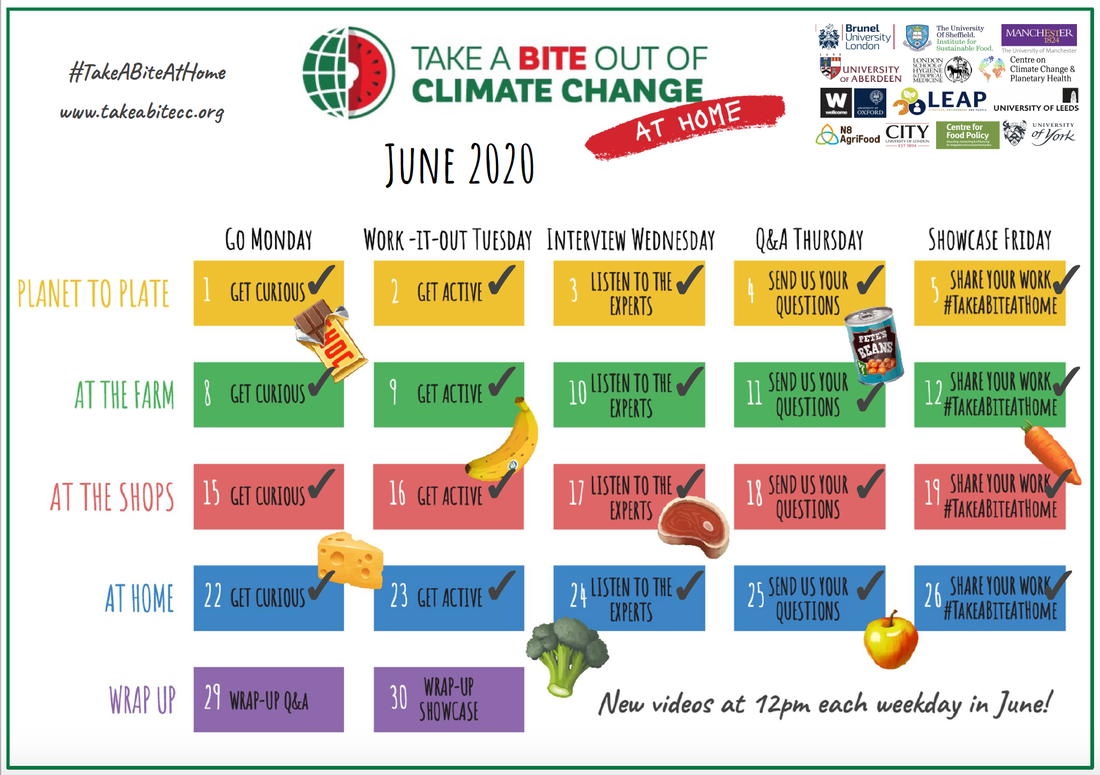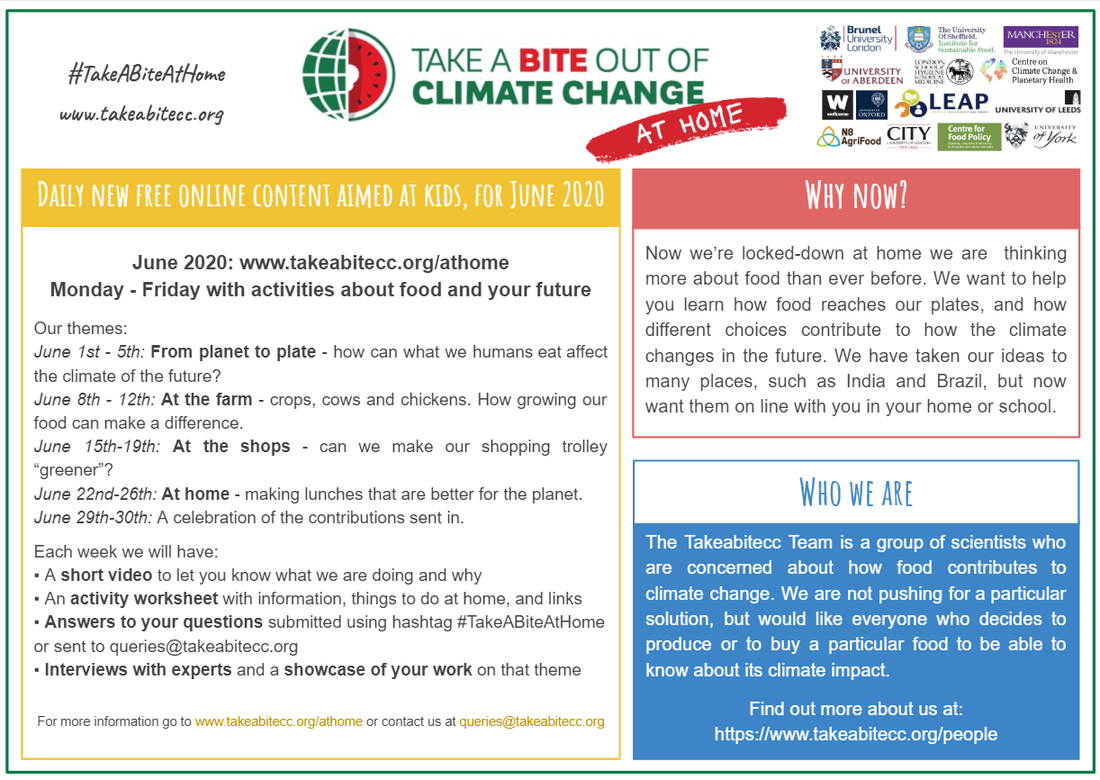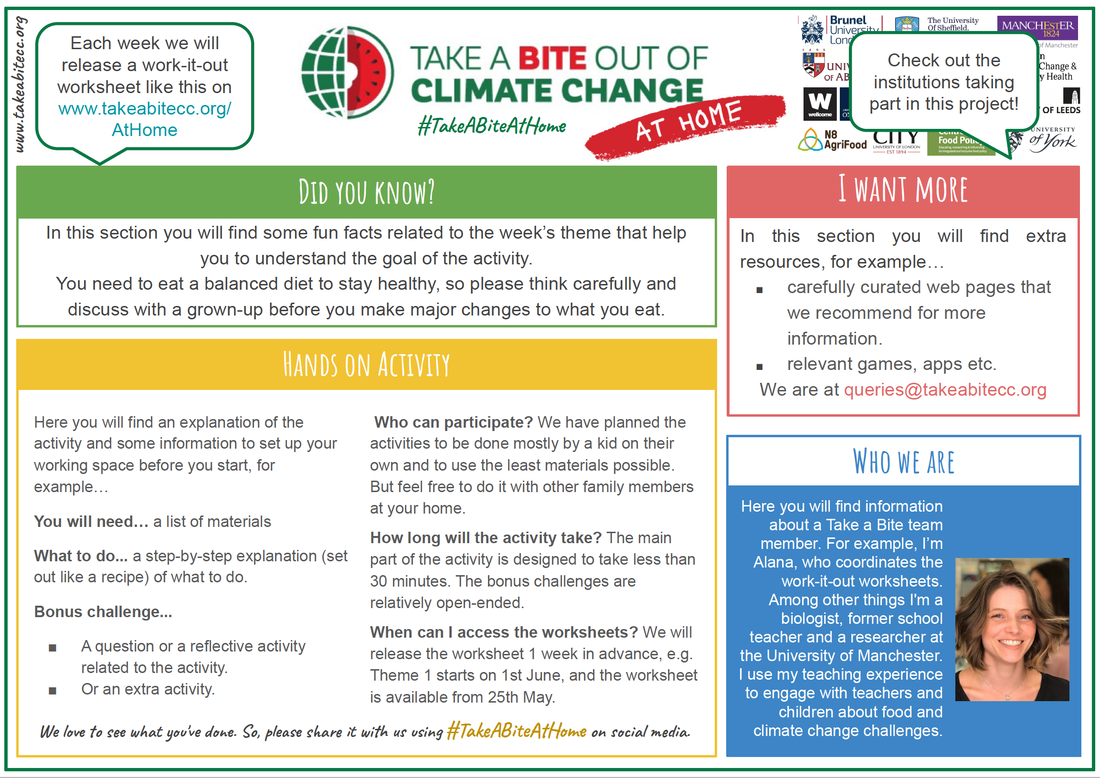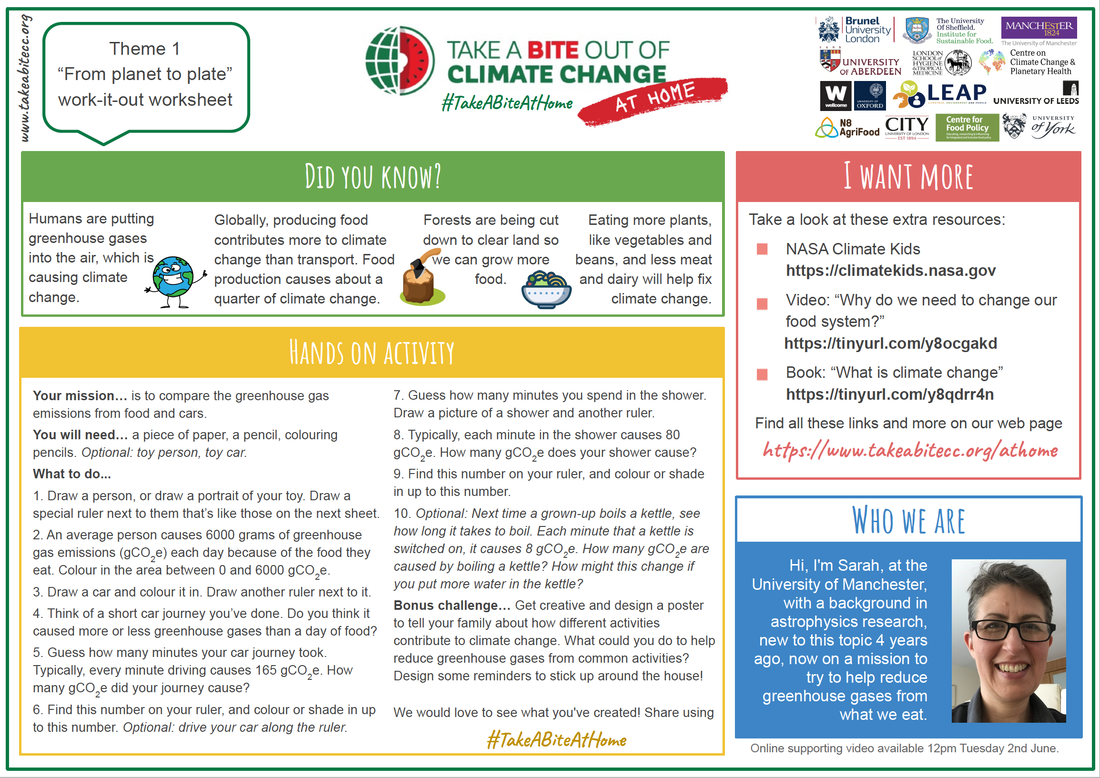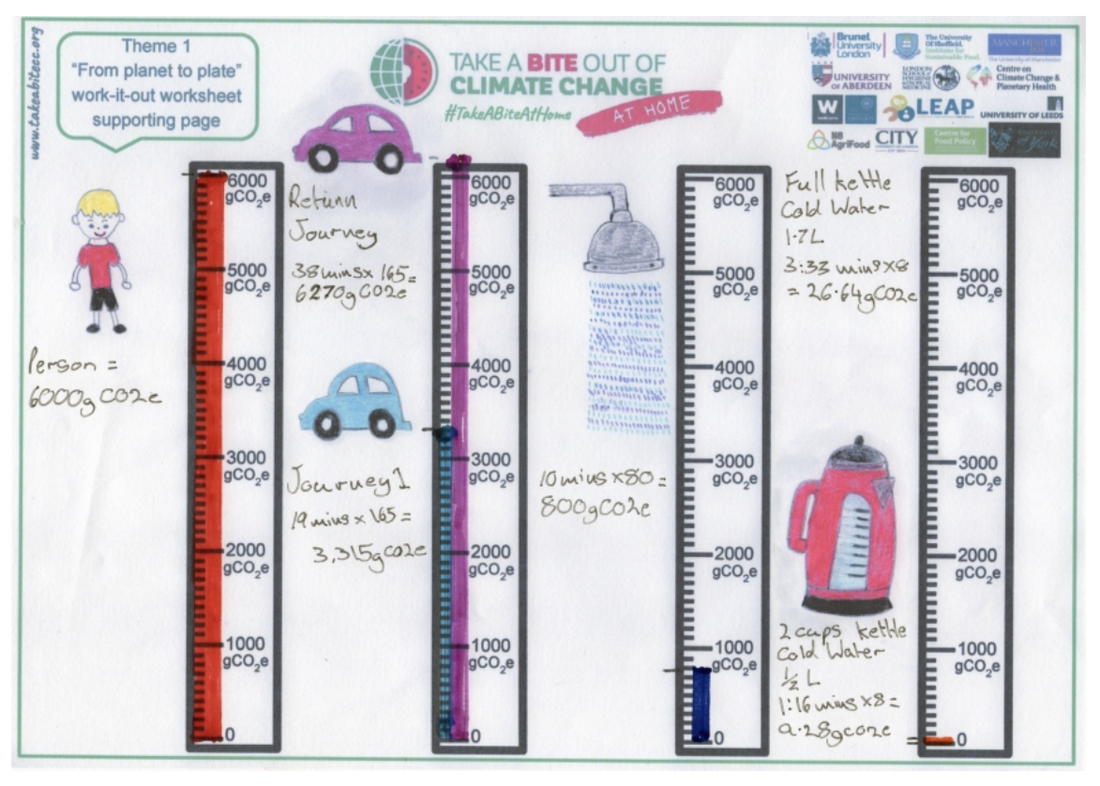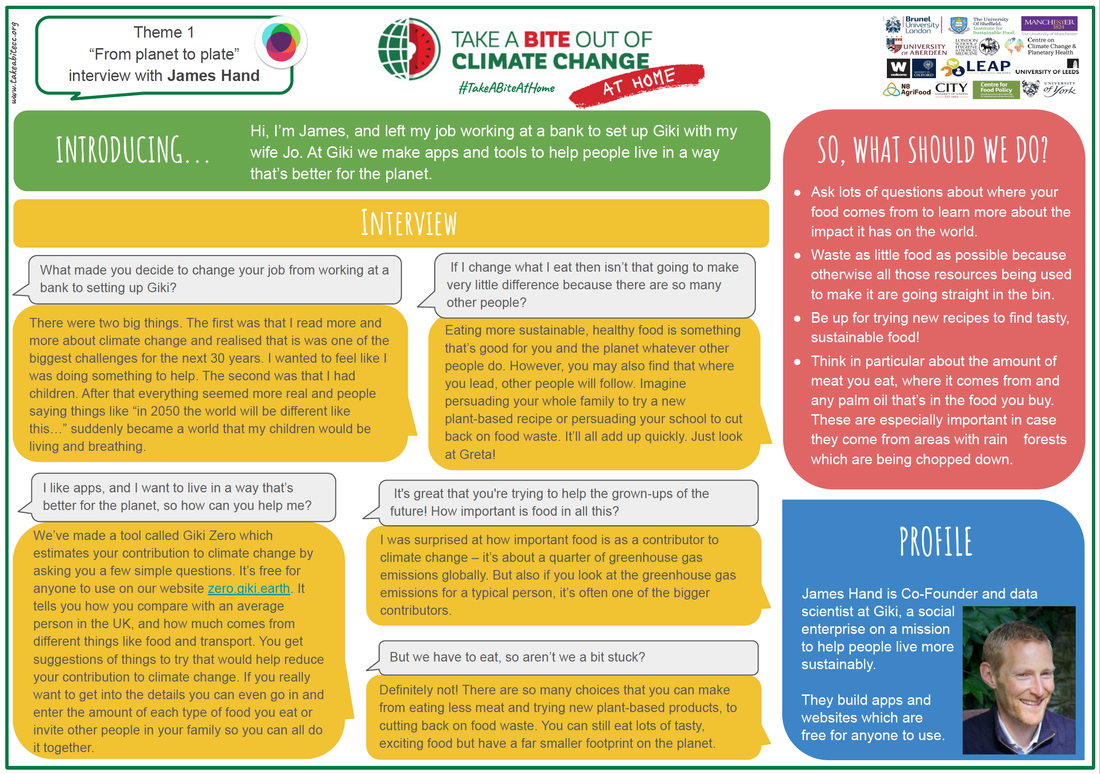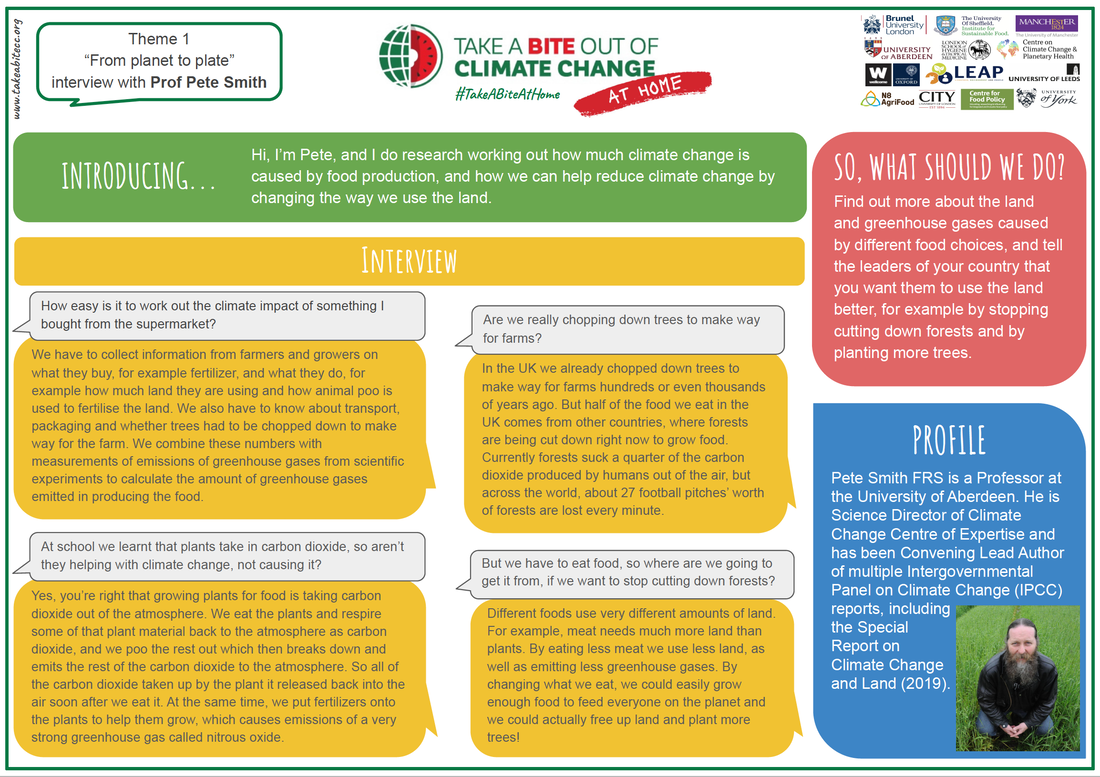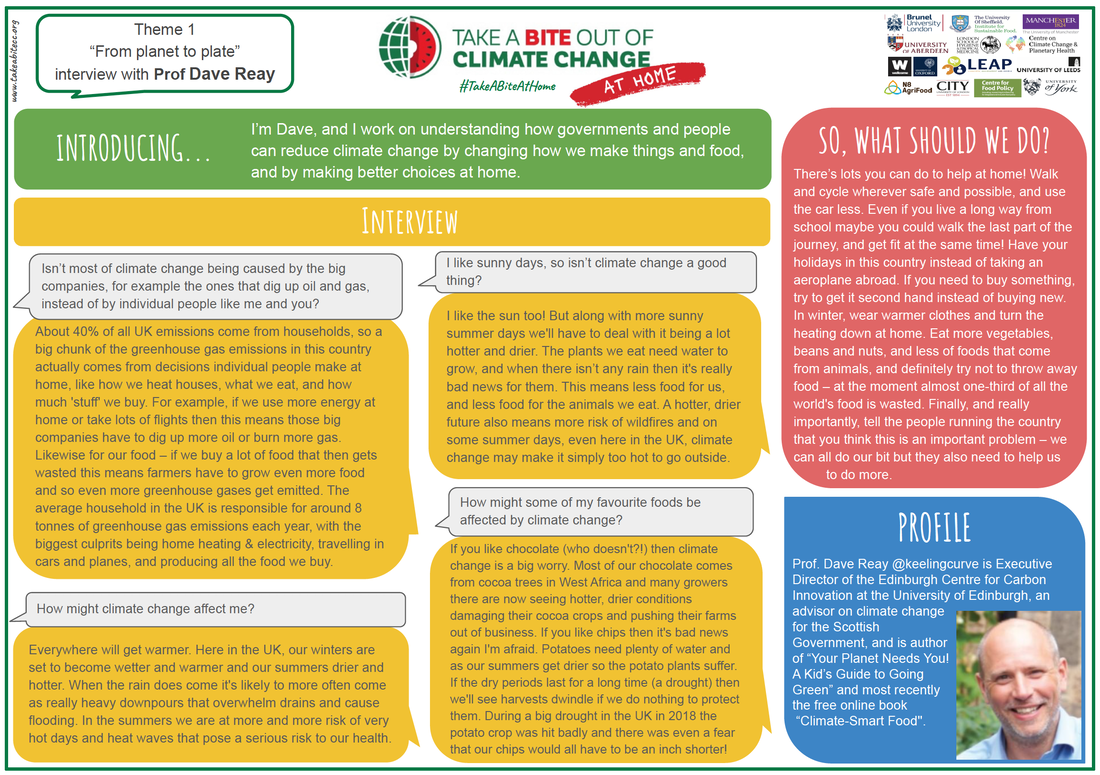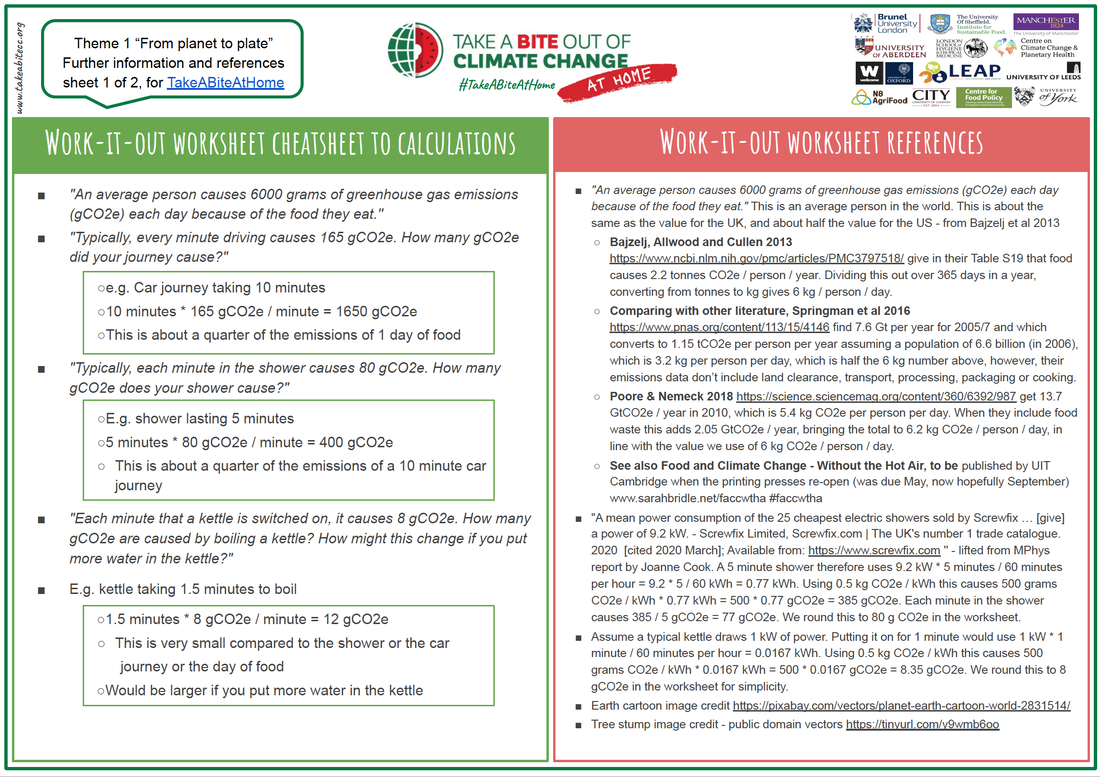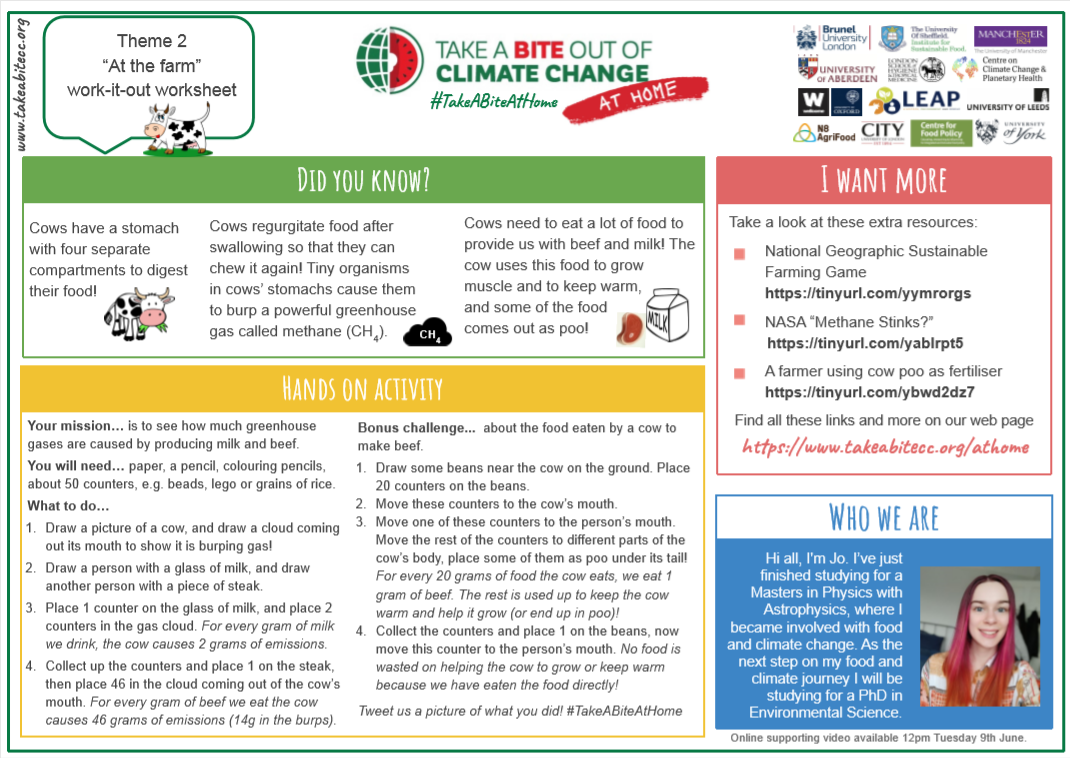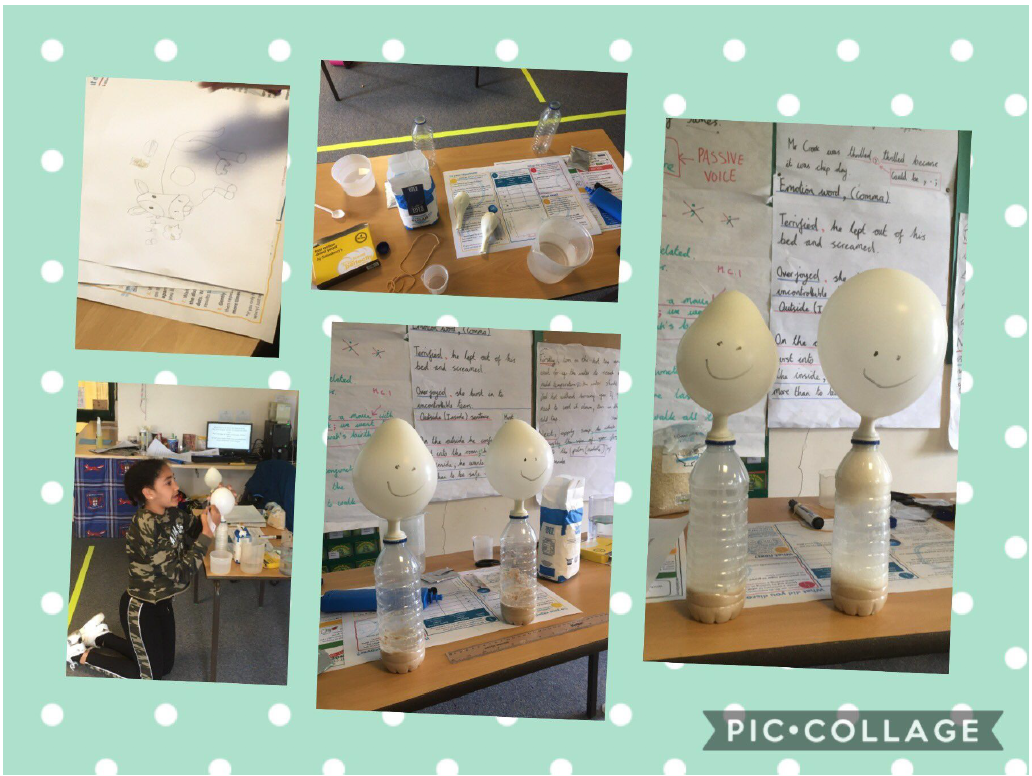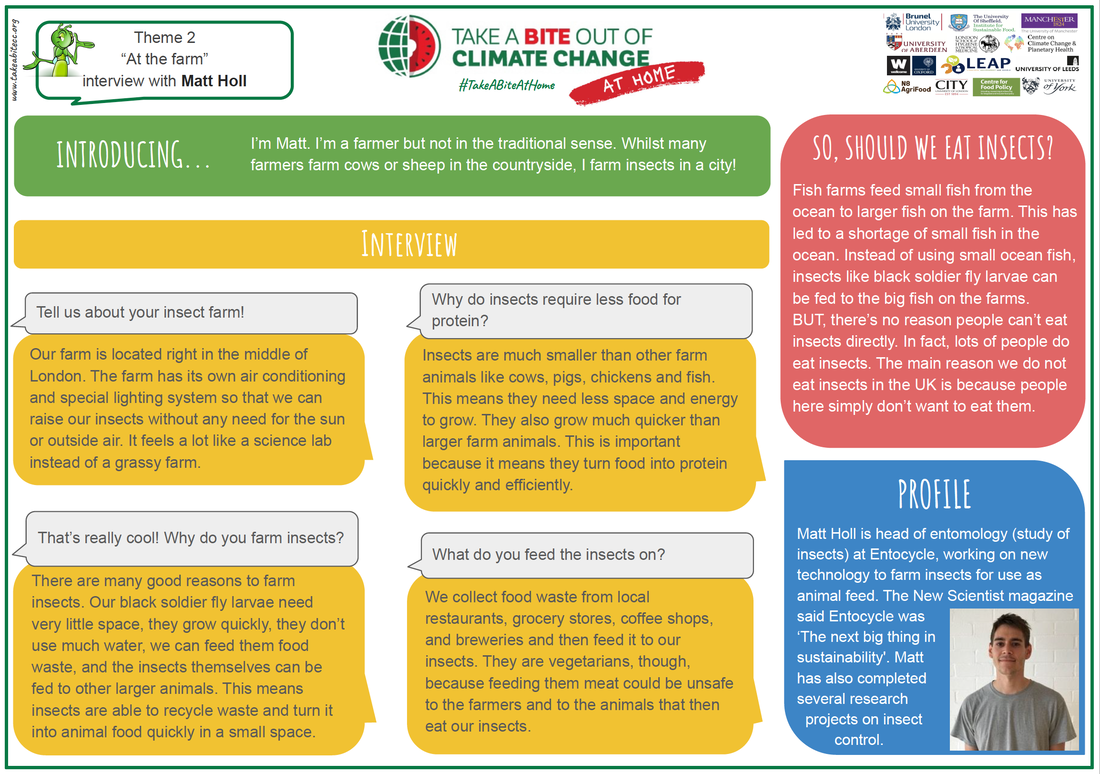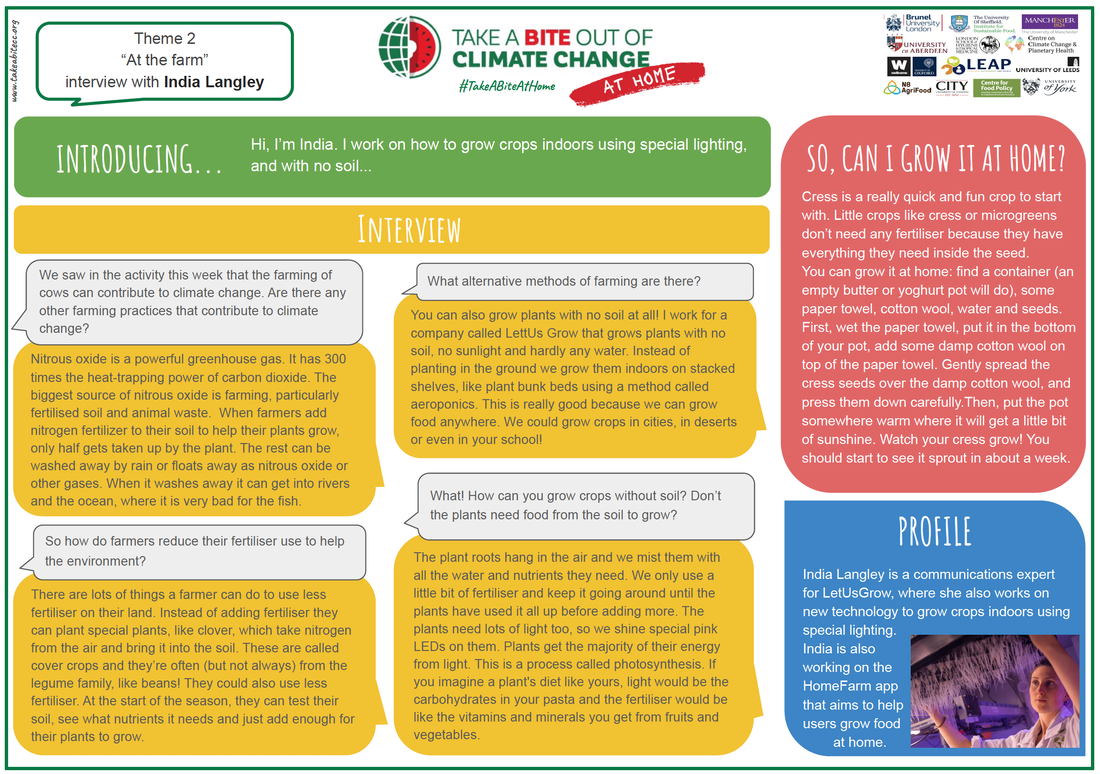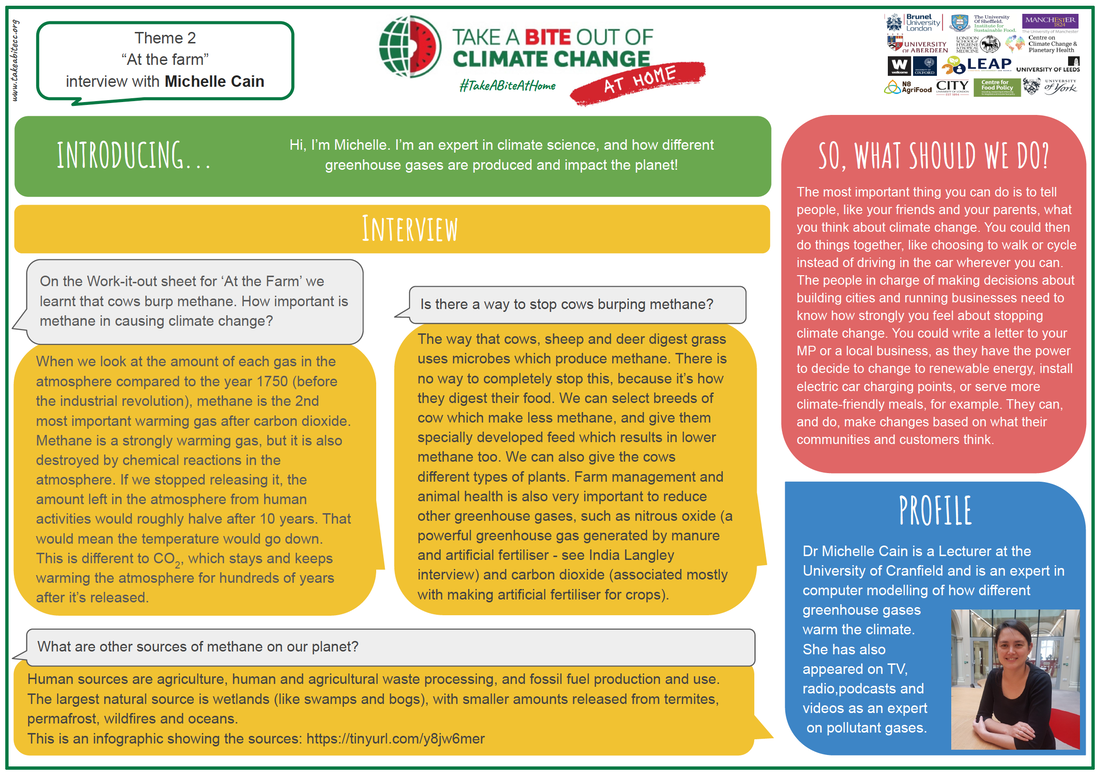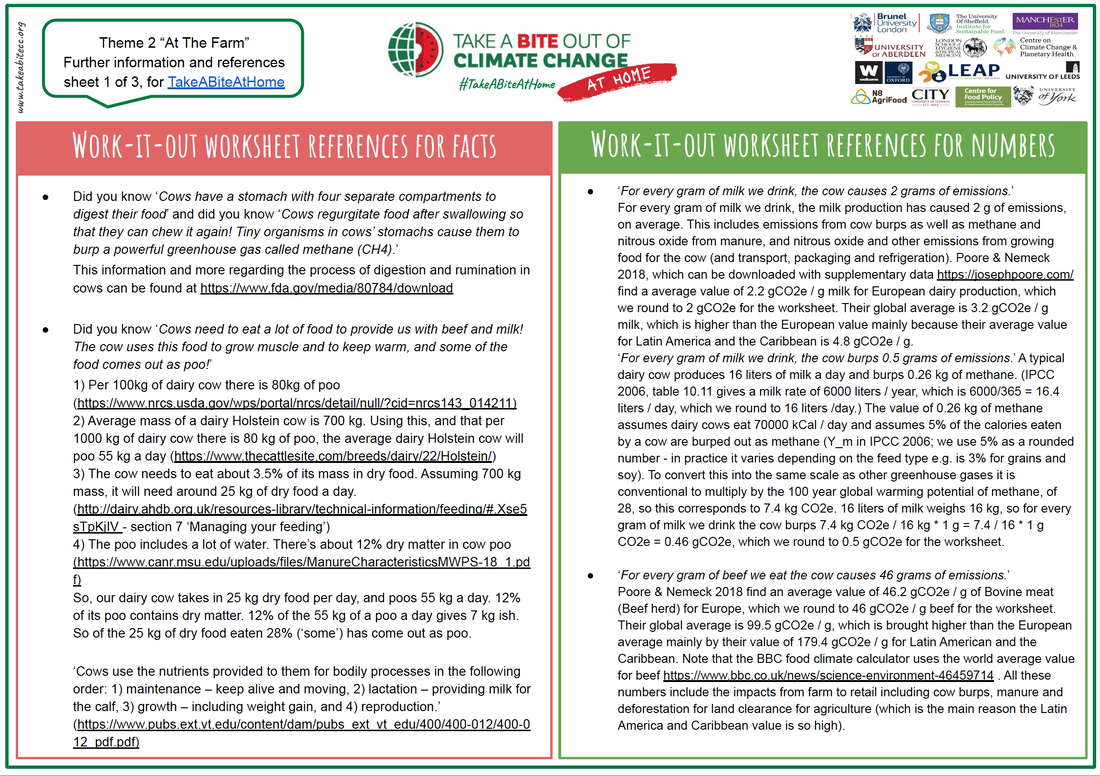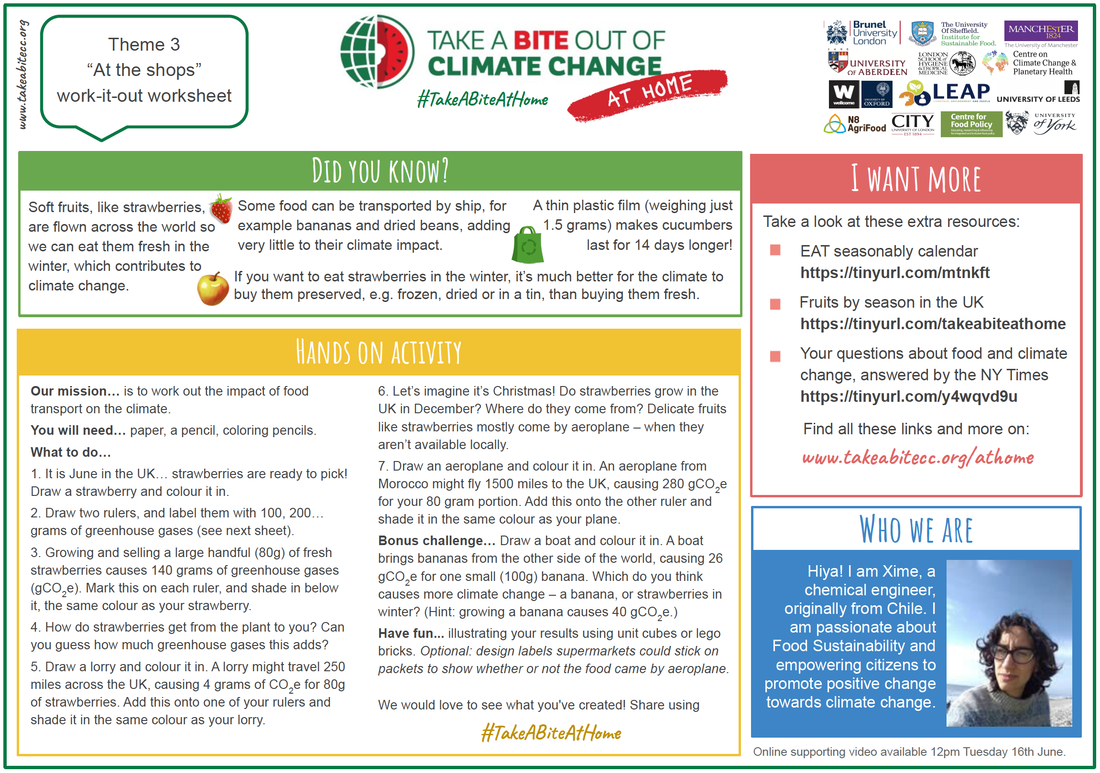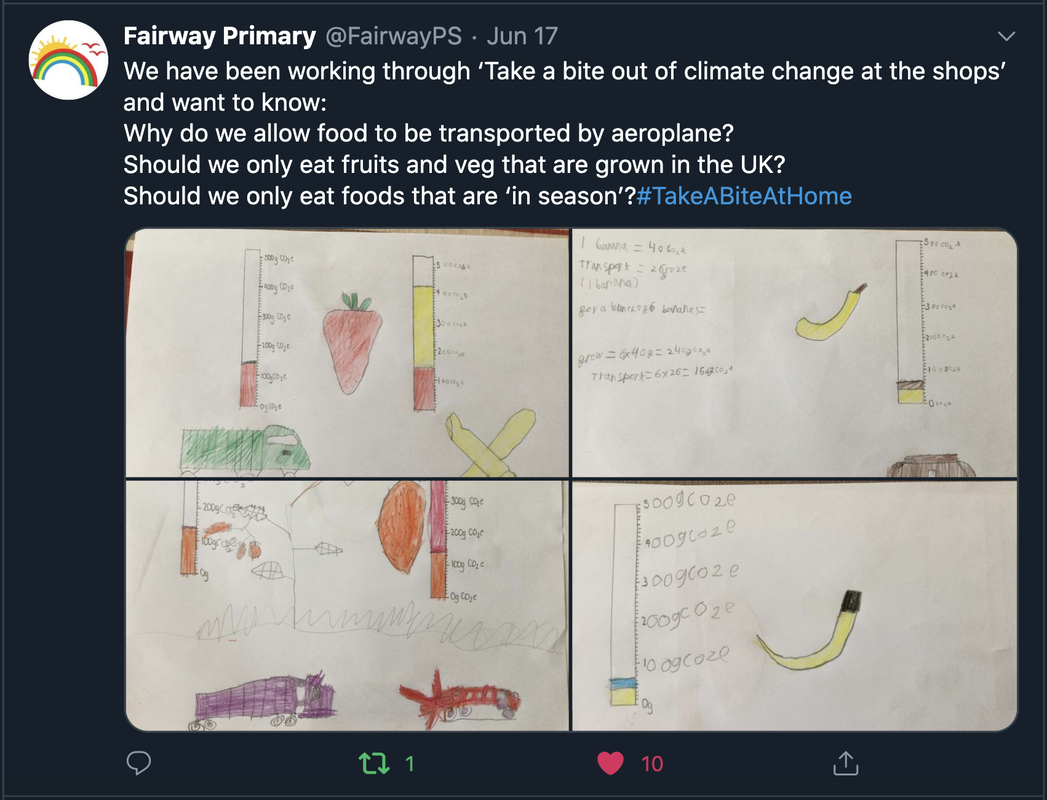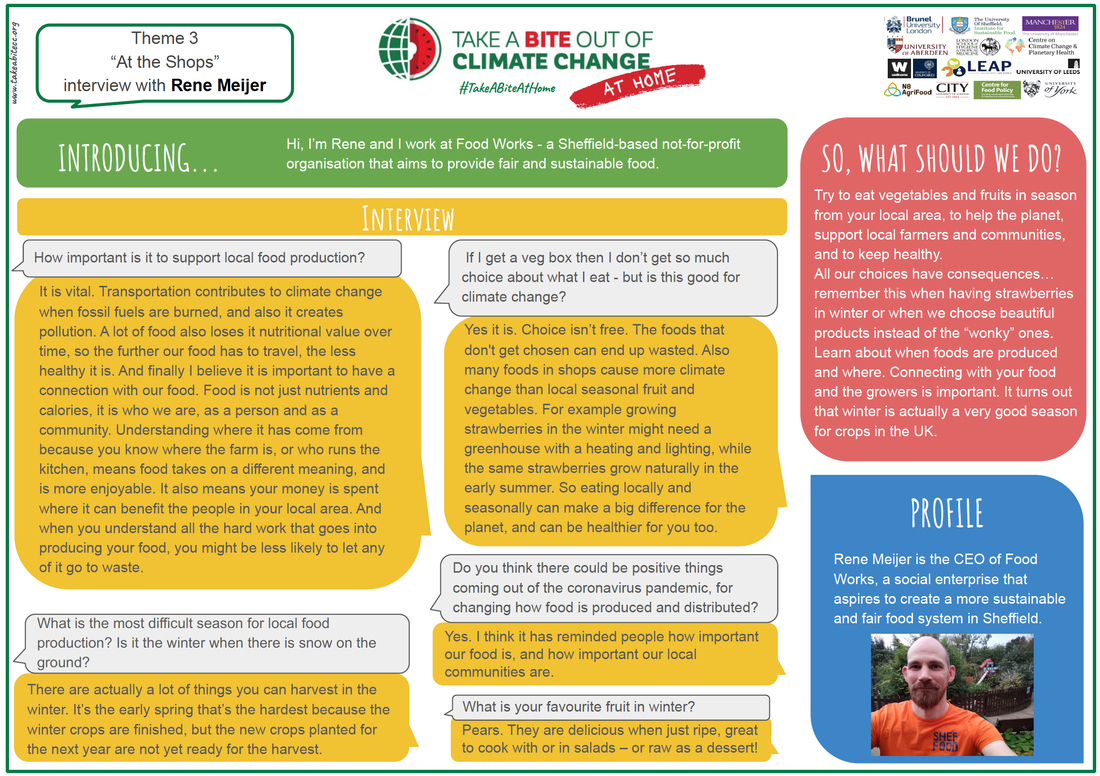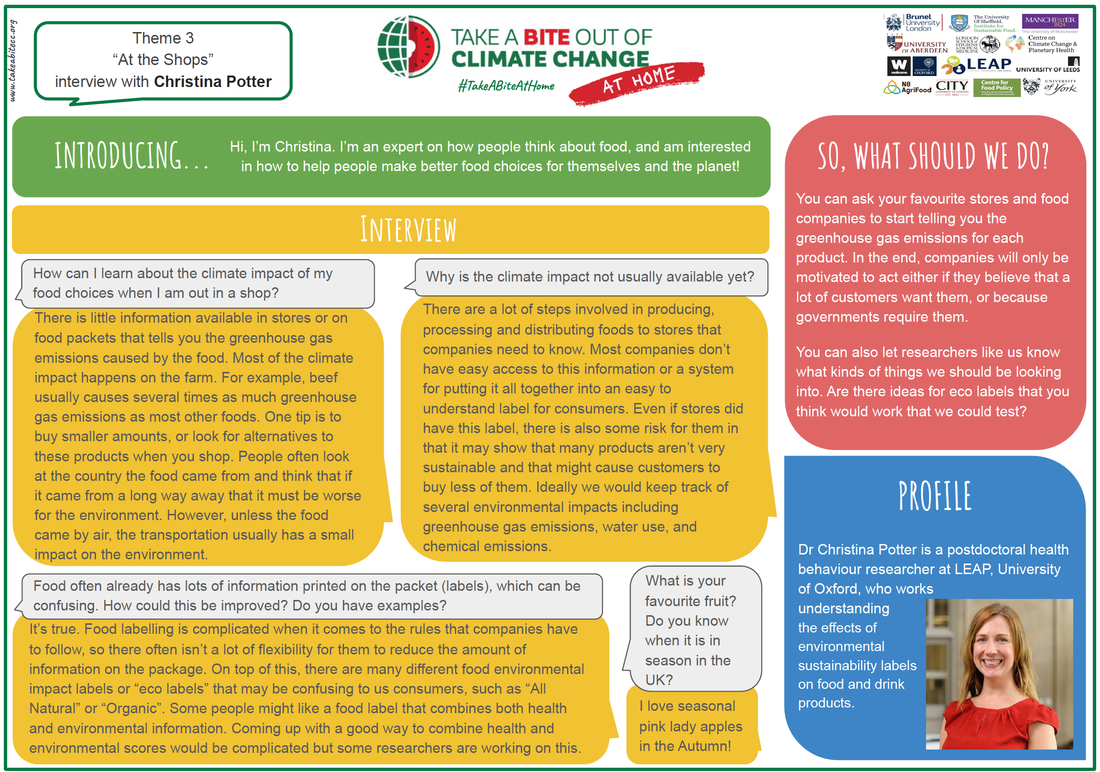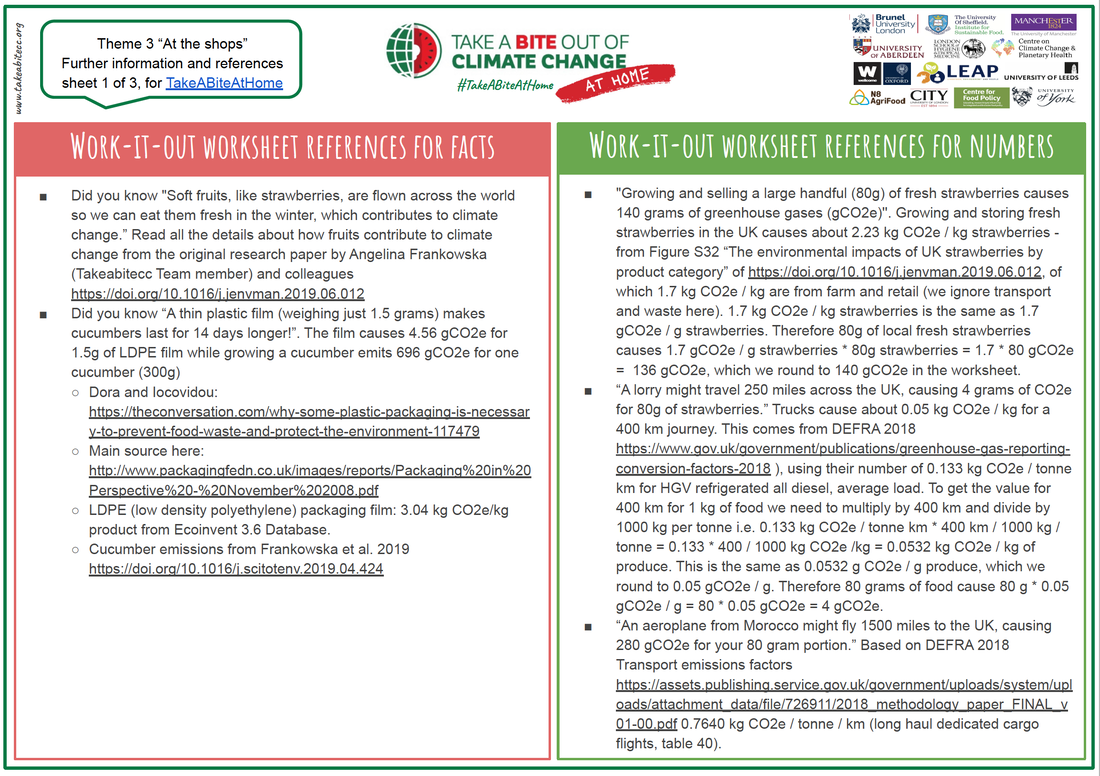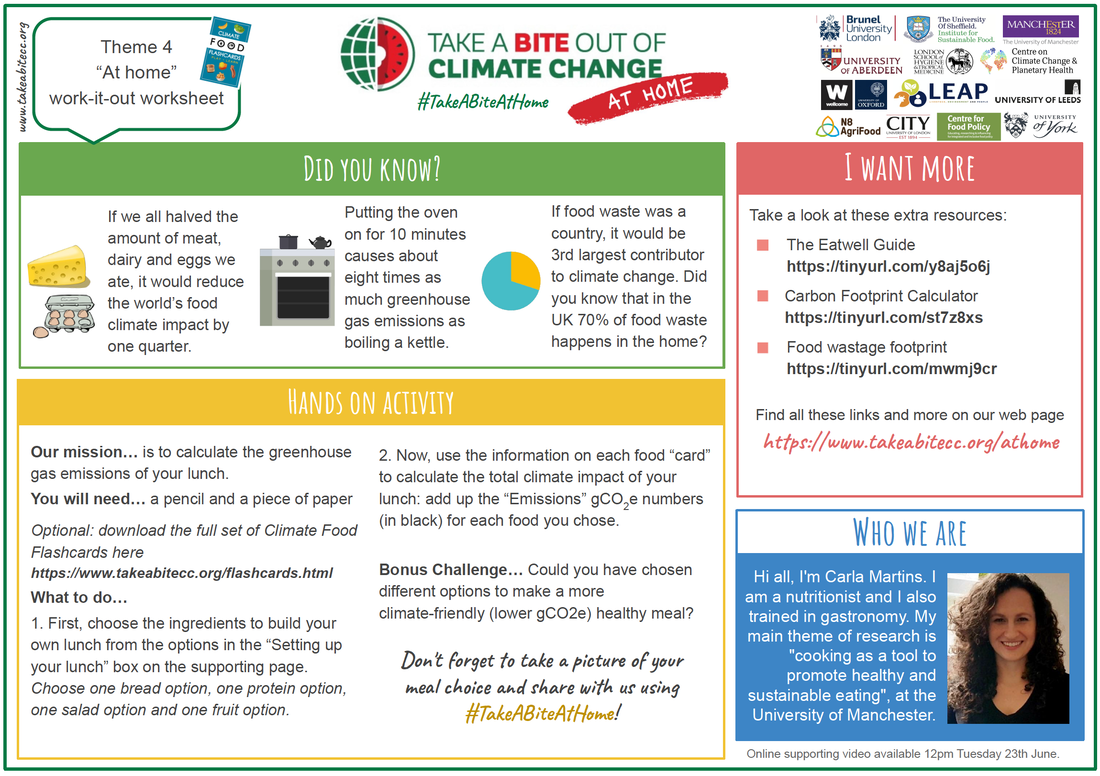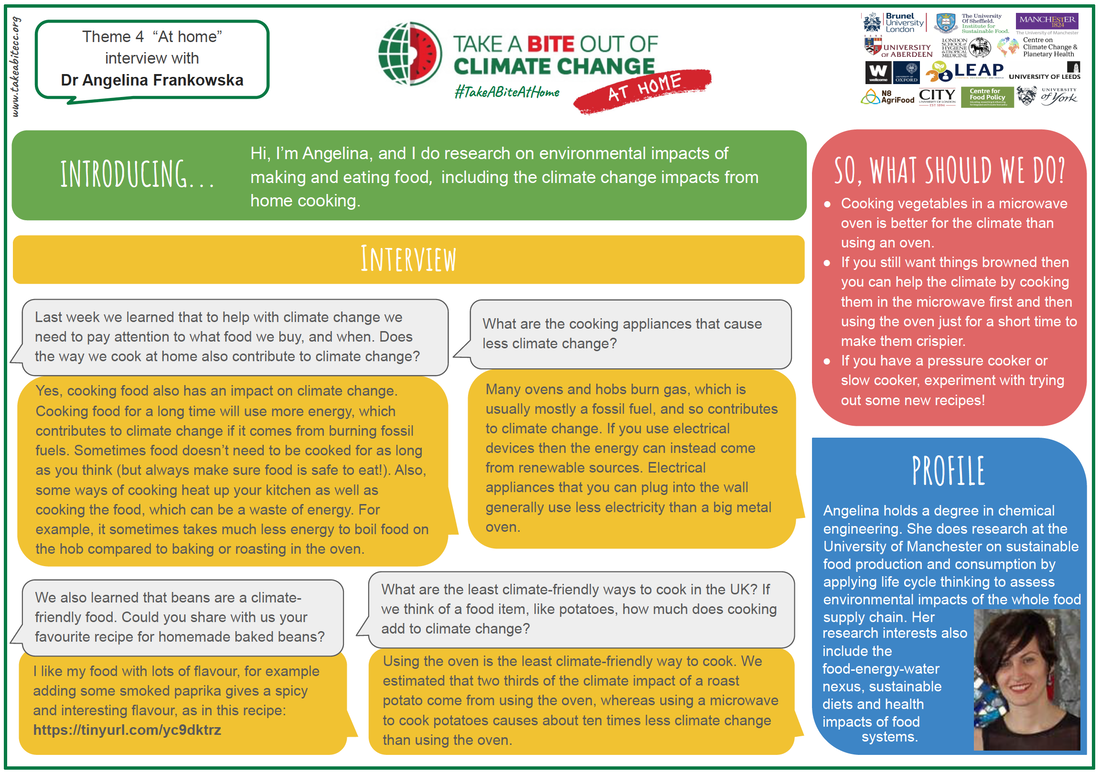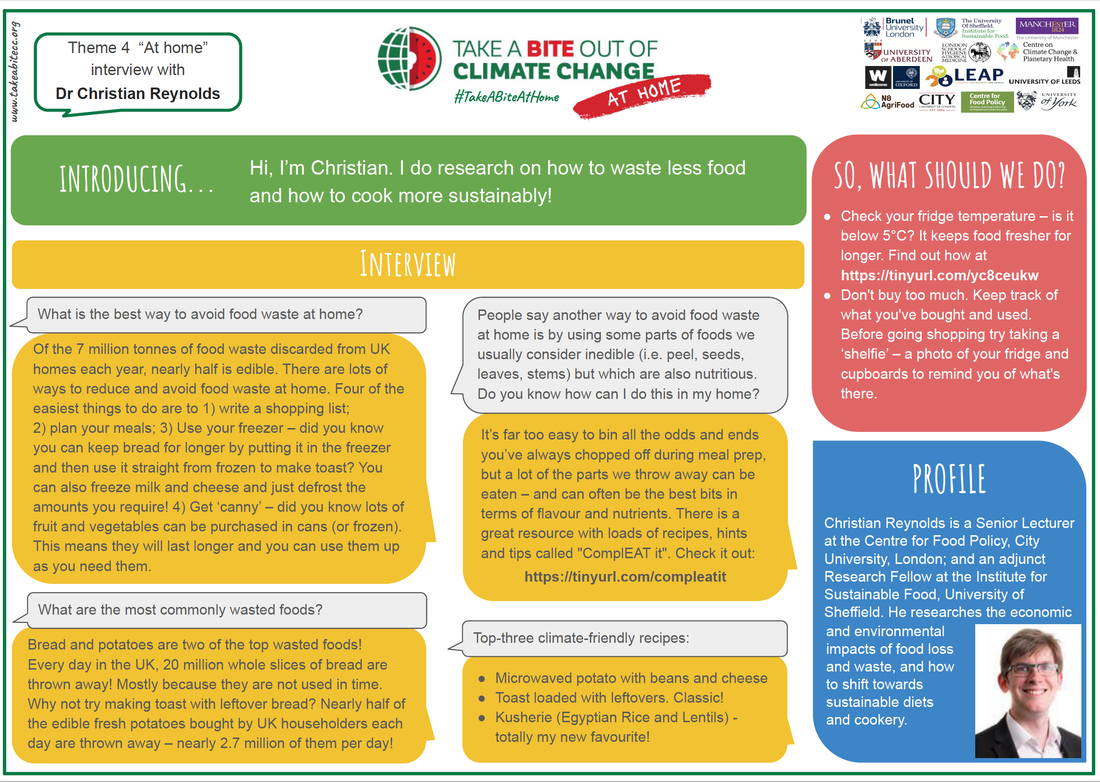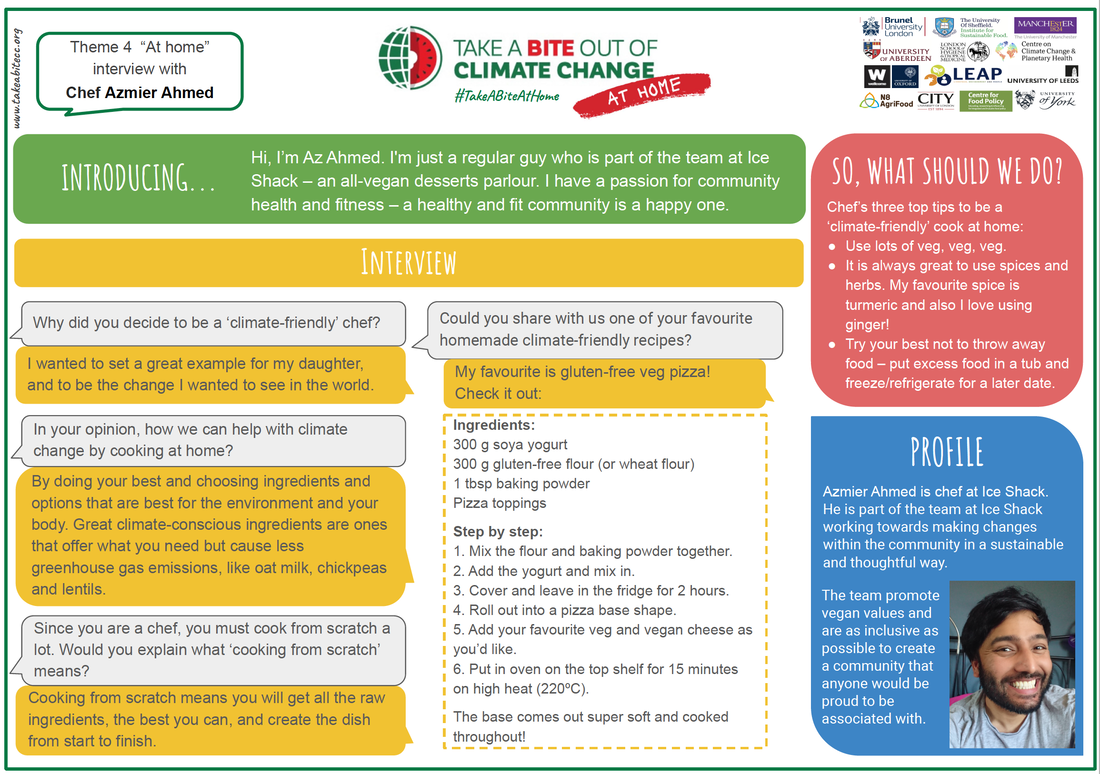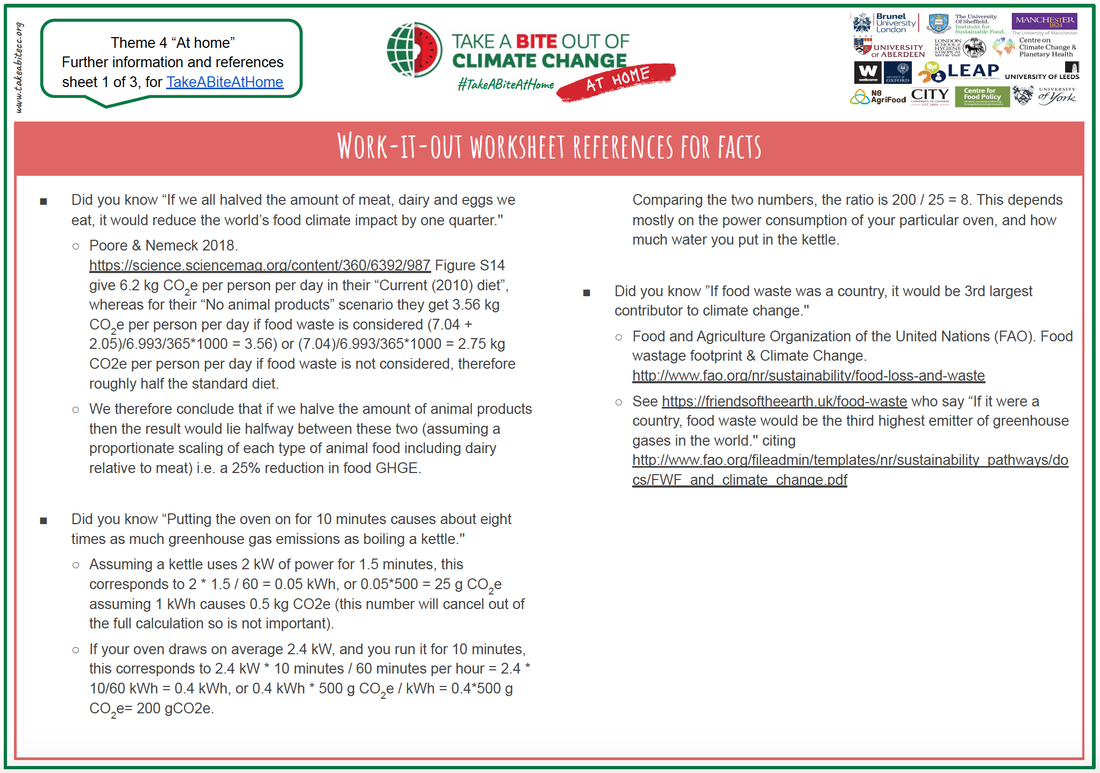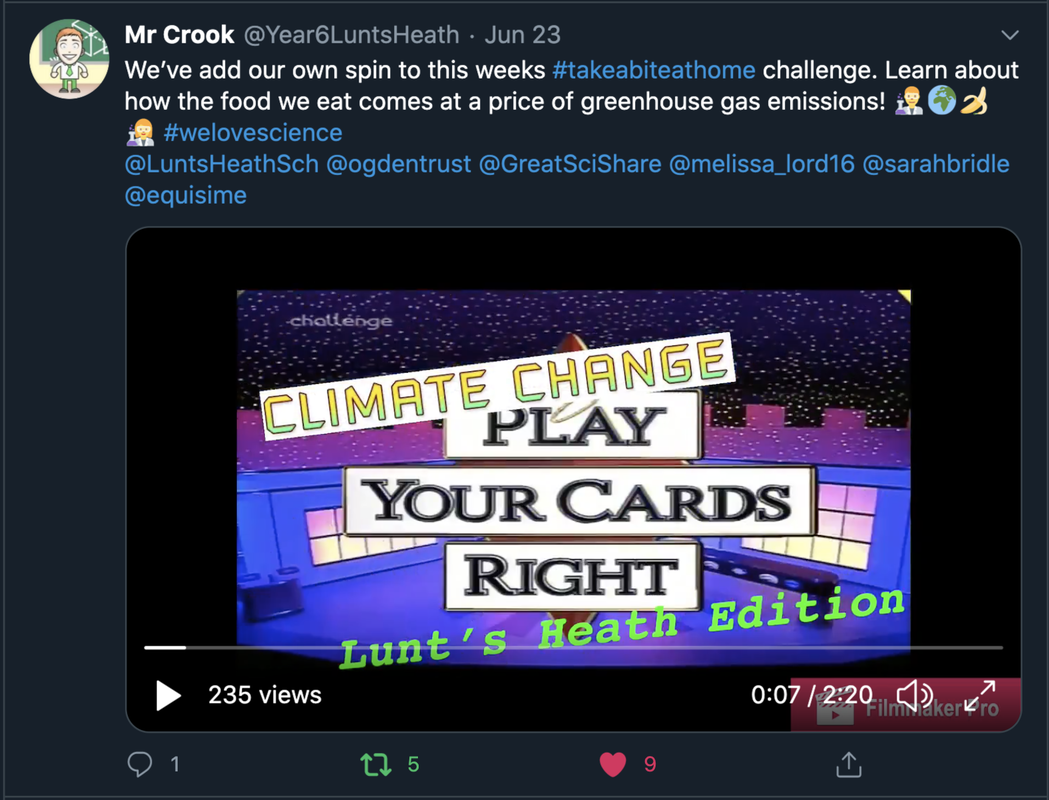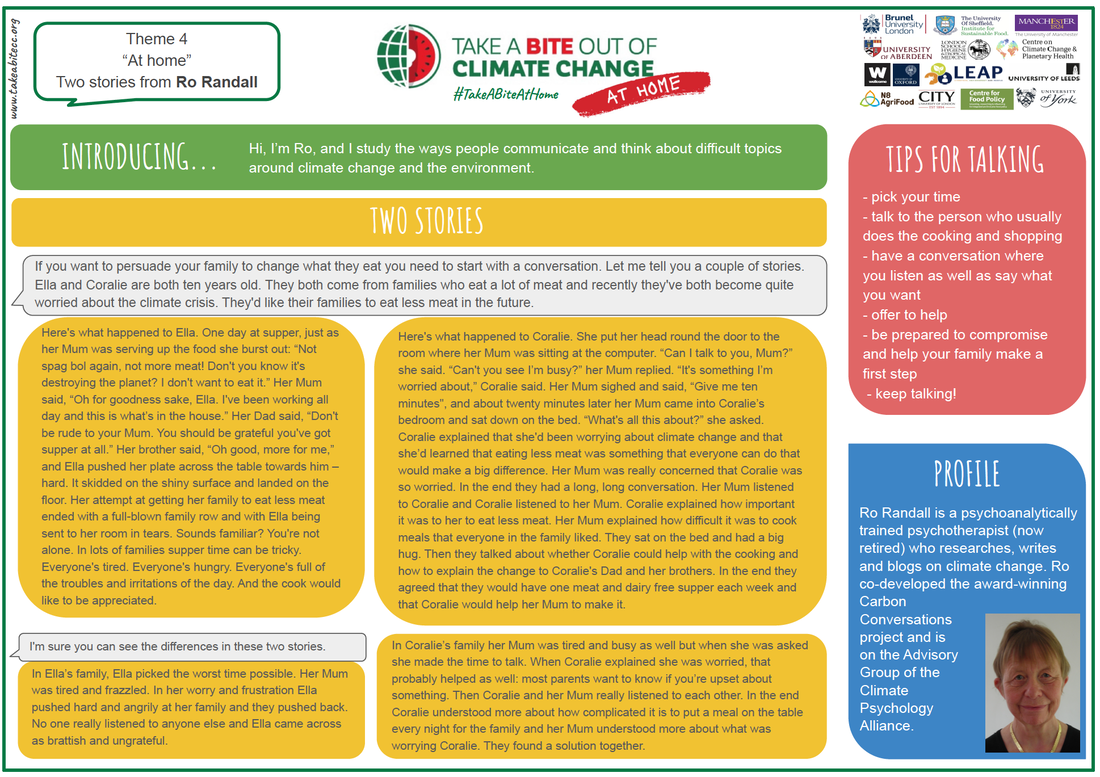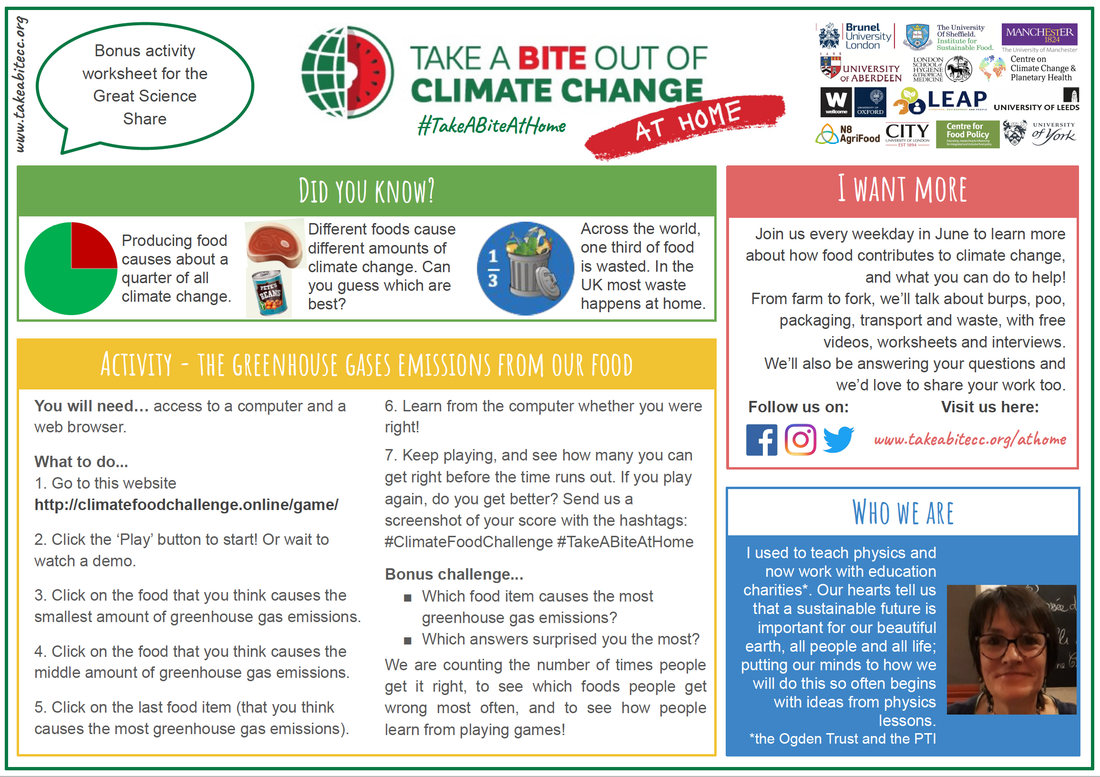How does our food affect the planet?
DAILY NEW FREE ONLINE CONTENT AIMED AT KIDS, FOR JUNE 2020
We set up the Take a Bite out of Climate Change (TakeABiteCC) project to share widely the scientific consensus about how food and agriculture contribute to climate change. We try to provide easily accessible information and fun activities, and help citizens understand how they can help. You can find out more about who is involved and the resources we have created throughout these webpages.
We set up the Take a Bite out of Climate Change (TakeABiteCC) project to share widely the scientific consensus about how food and agriculture contribute to climate change. We try to provide easily accessible information and fun activities, and help citizens understand how they can help. You can find out more about who is involved and the resources we have created throughout these webpages.
Theme 1: From Planet to Plate
How can what we humans eat affect the climate of the future?
Theme 1 - Go monday
get curious
Theme 1 - Work-it-Out Tuesday
Get Active
Winner of the week
|
Theme 1: Q&A Thursday Answering your great questions with Dave Reay (University of Edinburgh), Lucy Yates (Public Engagement Manager for the Wellcome funded Livestock, Environment and People project, University of Oxford) and James Hand (Co-Founder of Giki)!
|
Theme 1: Showcase FridayShowcasing your work with Takeabitecc Team members Fran Harris (London School of Hygiene and Tropical Medicine), Melissa Lord (former physics teacher), Alana Kluczkovski and Beckie Lait (both University of Manchester).
|
details and referencesFor details and references for Theme 1 facts you can find more here.
|
Theme 2: at the farm
Crops, cows and chickens - how growing our food can make a difference
Monday 9th June to Friday 12th June
Monday 9th June to Friday 12th June
Theme 2 - Go Monday
Get curious
Theme 2 - work-it-out Worksheet
Get active
WINNER OF THE WEEK
|
THEME 2 - INTERVIEW WEDNESDAY
HEAR FROM WORLD EXPERTS
Theme 2 - Q&A Thursday We put your questions to experts Michelle Cain (University of Cranfield), Maia Elliot UK Global Food Security Programme), Harriet Henrick (National Farmers Union), Katherine Denby (University of York) and Dave Johnson (University of Manchester).
|
Theme 2 - Showcase fridayShowcasing your work with Takeabitecc Team members Zoe Woffenden (teacher, Fairway Primary School), Joanne Cook , Alana Kluczkovski and Beckie Lait (all University of Manchester).
|
details and referencesFor details and references for Theme 2 facts, you can find more here.
|
Theme 3: At the shops
Can we make our shopping trolley more climate-friendly?
Monday 15th June to Friday 19th June
Monday 15th June to Friday 19th June
THEME 3 - GO MONDAY
Get curious
THEME 3 - WORK-IT-OUT WORKSHEET
Get active
WINNER OF THE WEEK
|
THEME 3 - INTERVIEW WEDNESDAY
HEAR FROM WORLD EXPERTS
THEME 3 - Q&A THURSDAYWe put your questions to experts Ximena Schmidt and Eleni Iacovidou (Brunnel University London), Christina Potter (University of Oxford) and Laurence Stamford (University of Manchester).
|
THEME 3 - SHOWCASE FRIDAYShowcasing your work with Takeabitecc Team members Mr Matt Crook (teacher, School), Xime Schmidt (Brunel University London), Alana Kluczkovski and Jade Ajagun-Brauns (University of Manchester).
|
DETAILS AND REFERENCESFor details and references for Theme 3 facts, you can find more here.
|
Theme 4: at home
Making lunches that are better for the planet.
Monday 22 June to Friday 26th June
Monday 22 June to Friday 26th June
THEME 4 - GO MONDAY
GET CURIOUS
THEME 4 - WORK-IT-OUT WORKSHEET
GET ACTIVE
THEME 4 - INTERVIEW WEDNESDAY
HEAR FROM WORLD EXPERTS
THEME 4 - Q&A THURSDAYWe put your questions to experts Ro Randall (psychotherapist on climate change), Christian Reynolds (City University London), Jacqueline Silva (University of Sao Paulo), Angelina Frankowska and Sarah Bridle (both University of Manchester).
|
THEME 4 - SHOWCASE FRIDAYShowcasing your work with Takeabitecc Team members Xime Schmidt (Brunel University London), Alana Kluczkovski and Beckie Lait and Carla Martins (all University of Manchester).
|
DETAILS AND REFERENCESFor details and references for Theme 4 facts, you can find more here.
|
WINNER OF THE WEEK
|
Final week
wrap-up q&AThis Q&A we’re focusing on questions that go beyond what we can do as individuals - to talk about what we can ask of the people who run the country. We put your questions to experts Lynne Bianchi (Great Science Share for Schools Director) and Sarah Bridle (University of Manchester), Julian Huppert (Jesus College Cambridge), Ian Boyd (Chief Scientific Adviser, Defra 2012-2019).
|
WRAP-UP ShowcaseShowcasing your work and discussing what we've learnt with all Takeabitecc Team members and Mr Crook (Lunt's Heath Primary School), Mrs Woffenden (Fairway Primary School).
|
two stories from Ro RandallThis activity sheet provides tips on talking to family members about climate and dietary change using stories to help getting us to understand when is a good time to approach adults and/or decision makers about these issues.
|
More...
We're taking part in the Great Science Share #GreatSciShare by releasing a bonus worksheet! Try it out and tell us how you got on via #TakeABiteAtHome or [email protected]
Mental health warningWe asked Dr Chantal Basson her thoughts on how these materials could adversely affect the mental health of young people. We are very grateful for her advice.
Dr Chantal Basson
Lead Consultant Clinical Psychologist for Children Healthy Young Minds (CAMHS) Pennine Care NHS Foundation Trust |
Chantal says: "Understanding the environmental impact of how we live our day to day lives, including what we eat, is becoming increasingly important. Feeling able to impact the world in which we live can be empowering for young people, especially at a time during lockdown where young people have very little control. It has also been of paramount importance to understand the impact that the coronavirus lockdown has had on the mental health of children and young people.
If food and eating feels like it's taking over your life then it may be becoming a problem. If a member of your family has difficulties with food, especially if they are currently restricting their food intake or have done so in the past then, from a mental health perspective, we would recommend that you don't use these resources." |
Chantal adds "If you are worried, you can talk to your GP surgery over the phone or look at these resources for help.
https://youngminds.org.uk/find-help/for-parents/parents-guide-to-support-a-z/parents-guide-to-support-eating-problems/
Here is a really good resource for childhood anxiety during corona-virus
https://www.annafreud.org/media/11544/coronavirus-research-bite-1-self-management-for-anxiety.pdf "
https://youngminds.org.uk/find-help/for-parents/parents-guide-to-support-a-z/parents-guide-to-support-eating-problems/
Here is a really good resource for childhood anxiety during corona-virus
https://www.annafreud.org/media/11544/coronavirus-research-bite-1-self-management-for-anxiety.pdf "
The TakeaBiteAtHome project is coordinated by the following Takeabitecc Team members: Beckie Lait (videos), Alana Kluczkovski (worksheets), Melissa Lord (schools liaison), Sarah Bridle (theme 1), Joanne Cook (theme 2), Ximena Schmidt (theme 3), Carla Adriano Martins (theme 4), with input from the Takeabitecc Team. We are grateful to Ben Dare for proofreading and Carys Lavin for making the calendar, Estefani and Pablo Guimaraes for starring the walking throughout videos, as well as everyone who contributed to developing the materials so far - see our acknowledgements page for more details, including our funders.
Why now?Now we’re locked-down at home we are thinking more about food than ever before. We want to help you learn how food reaches our plates, and how different choices contribute to how the climate changes in the future. We have taken our ideas to many places, such as India and Brazil, but now want them on line with you in your home
|
Who we areThe Takeabitecc Team is a group of scientists who are all concerned about how food contributes to climate change. We are not pushing for a particular solution, but would like everyone who decides to produce or to buy a particular food to be able to know about its greenhouse gas impact.
|
